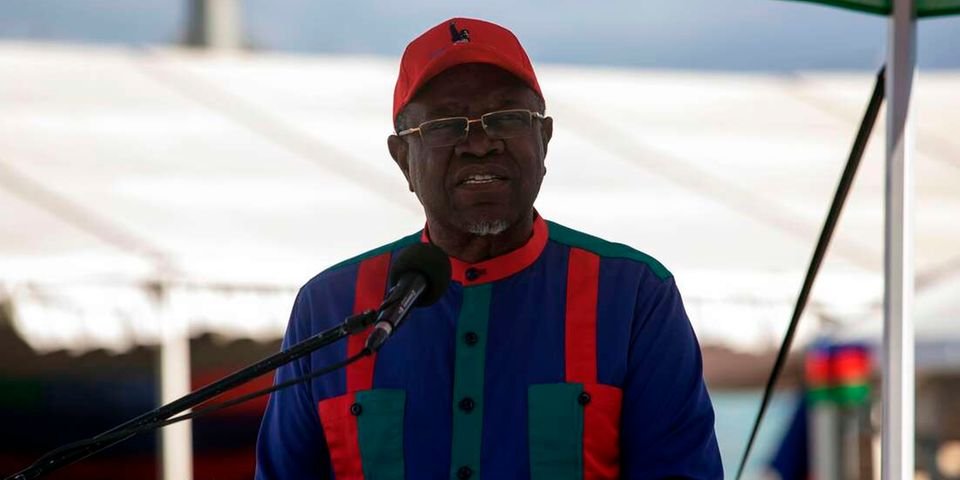Namibia: Third Wave to Peak Around Mid-August – Geingob

PRESIDENT Hage Geingob says that expert projections and simulation tools indicate that the rising incidence curve of the Covid-19 third wave in Namibia is expected to peak around mid-August and may continue well until mid-September 2021.
“The darkest hour of the night comes just before daybreak. It is expected to get worse, before it becomes better. We must therefore do everything in our power to suppress the rate of transmission. Only you and I can stop the further spread of this virus from ravaging our homes and communities,” Geingob said during yesterday Covid-19 public briefing at State House.
He said new Covid infections are rising exponentially and the country continues to record an increasingly high number of hospitalisations and deaths.
“The number of new cases per day has more than tripled since the first week of June, from an average 507 cases per day to the current average of 1 798 cases per day.
“Over the past two weeks, a total of 59 015) tests have been conducted, with a positivity rate of 41%. This means four out of every 10 people you interact with in your day-to-day dealings are likely to be Covid-19 positive. This rising level of exposure is of great concern, because of the highly transmissible nature of the virus,” Geingob said.
He added that Namibia has reached a critical moment in the fight against Covid-19 “and we must wage this war with the determined resolve to overcome – as a united front against a common enemy”.
Geingob also said yesterday that although not confirmed yet, all indications are that the Delta variant of the novel coronavirus, first detected in India, has reached Namibia.
Meanwhile, the government has moved to extend the country’s partial travel ban to all of its regions, while travel within regions is still allowed.
Geingob said the presence of the Delta variant would be confirmed by scientists by Friday.
“Investments are being intensified to strengthen the health sector across the country to respond to the rising demand for beds and medical care for those who need it most,” the president said.
Physician specialist Ismael Katjitae reiterated Geingob’s statement on Namibia experiencing its third wave of infections as a result of the Delta variant.
“We have not recorded any Delta variant in the country, but clearly the way this pandemic is behaving has got all the signs of a Delta variant,” he said.
Katjitae said the fact that the variant is present in Namibia’s neighbouring countries could be evidence that it is present locally.
“It is tentatively here, and it is most probably the one causing this rapid rise in numbers,” he said.
Dr Kaveto Sikuvi, emergency medicine specialist in the Ministry of Health and Social Services, who also addressed the public at the briefing, said the country is expected to reach the third wave’s peak within the next week or two.
He could not indicate whether a fourth wave is in sight.
Minister of finance Iipumbu Shiimi said the government’s approach with regards to regulations is to strike a balance between lives and livelihoods.
“The restrictions are limiting the movement of people and keeping and allowing most economic activities to continue,” he said.
IVERMECTIN
Katjitae said some patients who have used ivermectin as a treatment against Covid-19 have ended up in worse condition and some have ultimately died as a result.
According to the WHO, ivermectin is a broad-spectrum antiparasitic agent.
“We do see patients who have been taking ivermectin who have ended up in hospital with severe disease, and also people who end up losing their lives,” he said.
Katjitae said the perception that ivermectin cures or treats Covid-19 is misleading and needs to end, because people can lose their lives.
“They take this ivermectin thinking it will cure them. I have been treating people who have developed severe side effects – most probably from ivermectin. I have seen people with liver and kidney failure, so one should take it with caution,” he said.
Minister of health and social services Kalumbi Shangula has previously said local doctors have not heeded the call of the Namibia Medicines Regulatory Council to participate in a clinical trial for the use of ivermectin for the treatment or prevention of Covid-19.
Sikuvi added some patients who have taken ivermectin die at home, or on arrival at the hospital.
COVID-19 IN CHILDREN
Sikuvi said children are more affected by the current strain.
“Initially we did not see many children being infected, and if they are, they are playing around. We are now starting to see that children who are infected are being admitted [to hospital]. So we have to be cautious about that,” he said.
REGULATIONS
Apart from the travel ban, the Covid-19 curfew is now from 21h00 to 04H00, the sale of alcohol will only be allowed from Monday to Thursday from 09h00 to 18h00, and nightclubs, gambling houses and gyms are closed.
Covid-19 burials must strictly take place within 10 days after death, with only 10 people in attendance.
All food establishments are to serve food on a takeaway basis only.
This includes restaurants, food vendors and kapana traders.
All public and private schools (pre-primary up to Grade 9), including early childhood development centres, are currently on a special winter holiday until 26 July.
Face-to-face classes for Grades 10, 11 and 12 will be suspended countrywide from today until 16 July.
Moreover, face-to-face classes for institutions of higher education, including vocational education training providers, are also suspended for the same period.
All examinations for tertiary students will be undertaken online.
Hairdressers, tailors, and beauty salons will remain open, subject to strict adherence to regulations, with not more than 10 people at a time.
All contact sport as defined in the regulations remain prohibited.
For non-contact sport no spectators are permitted at live events.
Road and air public transport operators will not be permitted to travel between regions, including long-haul operators and aircraft between and within regions.
Motorists may only transport passengers to half the capacity of their vehicles.
A special dispensation for tourists will be put in place.
Further details will follow.
The adjustments will be in force from today until 15 July.
Shangula said in recent weeks, health facilities, both public and private, have recorded the highest number of patients admitted in the country’s history.
He said this has exerted tremendous pressure on the healthcare system, and mortuaries have reached their maximum capacity.
Shangula said funerals take place in different communities on a daily basis.
“As I always say, we do not want one funeral to breed more funerals,” he said.
“Our healthcare workers are working long hours taking care of patients. This is true for all frontline workers in the national effort to combat Covid-19. I salute them for their commitment to duty and their selfless patriotic service,” the minister said.
By Namibian.



